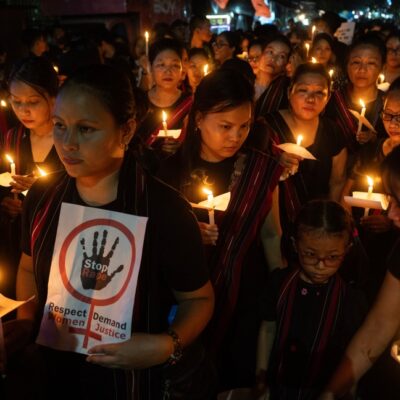Democracy is deteriorating in many parts of the world. Anna Lührmann and Staffan I. Lindberg, researchers of an international online dataset called V-Dem (Varieties of Democracy Project), even argue ‘a third wave of autocratization’ is nowadays manifest, with an eye to Samuel Huntington’s seminal book – The Third Wave of Democratization in the Late Twentieth Century.
Asia is no exception. This phenomenon is described in a variety of terms, such as backsliding, recession, rollback, and retreat. In Asia, several formally democratic states like the Philippines have indeed experienced a return to authoritarianism, while authoritarianism has seemingly deepened in others, such as Indonesia.
According to a 2024 report from the watchdog group Freedom House, 52 countries experienced severe declines in freedom in 2023; global freedom declined for the eighteenth consecutive year last year, with one-fifth of the global population seeing their political rights and civil liberties deteriorate.
This edition focuses on a development to deter the prevailing trend of democratic degeneration across Asia—the emerging movement to increase the transparency of national parliaments through the active intervention of Parliamentary Monitoring Organisations (PMOs, a type of civil society organisation). Established democracies have parliamentary monitoring built into their democratic institutions, but in new or emerging democracies civil society groups are essential to monitoring legislative bodies and elected legislators.
Countering democratic backsliding requires us to recognise its symptoms before it is too late. Additionally, we ought to equip allies of democracy such as PMOs with a framework for understanding the phenomenon so that they can formulate effective strategies to confront it.
Democracy has been eroded incrementally, as reflected in the gradual dismantling of domestic checks and balances and is generally conducted by an increasingly dominant executive. It does not usually take the form of a sudden collapse of democracy caused by a military coup. In fact, such democratic degeneration originates in the legislature. The greatest obstacle to the executive to centralise its authority is the legislature; the legislature gradually cedes powers to the executive and permits the control of other institutions through the appointment of loyalists and sycophants. Thus, control of the legislature is a crucial step in the collapse of the separation of powers – the weakening of horizontal checks on executive discretion.
Legislative transparency
Transparency is commonly seen as a prerequisite for democratic accountability as it provides citizens with information about their representatives’ activities. In addition, as several scholars such as Albert Meijer point out, transparency is a relational action in which different types of information providers and information recipients participate. Following these points, Nuria Font and Ixchel Pérez-Durán, referring to experiences in the European Parliament, suggest that legislative transparency occurs, for example, when legislators are required to report on their meetings with representatives of interest such as business leaders; why they are members of parties with libertarian positions, and when they work in countries with strong corruption mitigation regimes, to name a few.
Also based on European Parliament experiences, Aspasia Papaloi and Dimitris Gouscos suggest that legislative transparency requires parliamentary information visualisation. Information visualisation (IV) can serve as an intermediary between information and knowledge and has the potential to allow users to engage in interactive participatory activities known as collaborative IV. Parliamentary IV initiatives can contribute to legislative openness and accountability, and they fulfill the role of a mediator between the legislature and all interested parties, including the public, civil society, NGOs, and the media. PMOs across Asia have learned from these initiatives and many of their democratic innovations and techniques pertaining to this issue are documented in this edition.
Diagonal accountability
This edition addresses accountability – the center of many social scientific and policy debates. The authors in this edition developed their arguments in line with the definition of accountability provided by Anna Lührmann, Kyle L. Marquardt and Valeriya Mechkova as de facto constraints on the government’s use of political power through requirements for justification of its actions and potential sanctions.
Parliamentary monitoring activities done by PMOs can be understood in terms of what is called ‘diagonal accountability’, which reflects the contribution of non-state actors to legislative accountability. Civil society organisations, independent media, and engaged citizens can use a broad range of actions to provide and amplify information about the government, thereby holding it accountable. Also important is ‘vertical accountability,’ which refers to the ability of citizens to hold their government accountable through elections, and ‘horizontal accountability,’ which refers to checks and balances between state institutions.
When these vertical and horizontal accountabilities are broken in democratic backsliding, diagonal accountability becomes crucial. As Aurel Croissant and Jeffrey Haynes argue, Asian experiences suggest that what matters most in times of democratic regression and autocratisation are the effective mechanisms of diagonal accountability; and this edition documents the latest examples of diagonal accountability. These cases indicate that an active citizenry has the potential to defend democracy against threats to its survival. Indeed, ‘civil society is the ‘last line of defense’ against democratic erosion and eventual collapse,’ as Aurel Croissant and Larry Diamond point out.
Asian PMO Project
The Asia Institute’s Research Cluster on Asian Civil Society at the University of Melbourne launched the first steps in creating an Asian Network for Legislative Transparency in collaboration with the Asian Civil Society Research Network, by hosting the International Workshop on PMOs across Asia, November 29–30, 2023. This workshop was a follow-up meeting to a forum led by Taiwan’s Citizen Congress Watch in Taipei on March 15, 2023.
This edition presents the latest case studies on parliamentary monitoring activities in Asian countries following the International Workshop. Taiwan’s Citizen Congress Watch has authored an article on the importance of PMOs in preventing democratic decline). Sri Lanka’s Verité Research highlights the active parliamentary monitoring occurring in that nation. In Thailand, PMO iLaw is part of Thailand’s emerging parliamentary monitoring efforts. Authors from PSHK (Indonesian Center for Law and Policy Studies) and the Indonesian Parliamentary Center examine the limited space for parliamentary transparency in Indonesia. South Korea’s PSPD (People’s Solidarity for Participatory Democracy) and its ‘selection and election drop’ campaigns is critically examined. Authors from Mongolia’s National Center for Comprehensive Development NGO look at the insufficient level of parliamentary transparency in that nation. The Philippines’ Action for Economic Reforms share lessons from its successful law reform. In addition, the extreme difficulty of monitoring parliaments in the context of failing or failed democracies such as Cambodia and the work of COMFREL, and Myanmar are discussed.
Since early this year, these PMOs, as part of the Asian Network for Legislative Transparency, have meet online every two months. The number of participants exceeds 40 people at present. The PMOs are learning from Latin-American as well as African experiences and this edition includes a report from the Directorio Legislativo, a PMO in Argentina that is leading the operation of the Latin American Network for Legislative Transparency which has established an Index of Legislative Transparency aiming to foster more democratic parliaments using an objective measurement tool.
Finally, it should be noted that the Asian PMO project will officially start later this year with funding from the National Democratic Institute, a Washington D.C.-based NGO. In collaboration with Taiwan’s CCW, my research team and I will primarily work to establish an Asian version of the Index of Legislative Transparency in the coming years.
Image credit: hasuco Saigon/Flickr.




